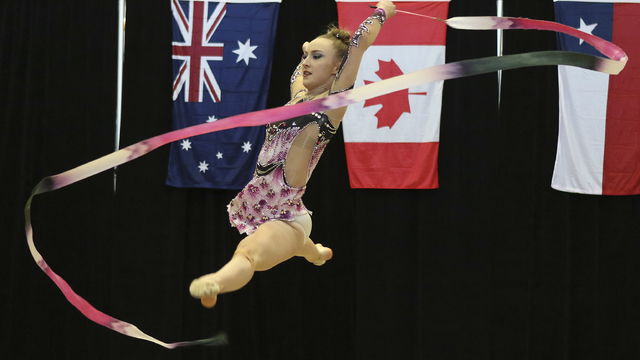Gymnastics fans anxious for the 2016 Summer Olympic games were treated to a taste of what’s to come at the Pacific Rim Championships last weekend in Everett.
For the second time in four years, the biennial event came to Xfinity Arena, showcasing the world’s top gymnastics athletes before the Olympics are held this summer in Rio.
The Pacific Northwest may have had an inside connection for the event in USA Gymnastics President and CEO Steve Penny, an Island native and 1982 graduate of Mercer Island High School. Penny also helped bring the Pacific Rim Championships to Everett in 2012, drawing over 20,000 for the three-day event.
Penny described the Pacific Rim Championships as a “very friendly” competition between all the Pacific Rim countries, as well as an opportunity for athletes to get tuned up before going on the Olympic stage.
“I was up here for a figure skating event in Everett and I just saw how well it worked,” Penny told the Reporter. “When I looked at it [in 2012], we really hadn’t brought an event back here since the 1990 Goodwill Games. I just knew the area would be very supportive of USA Gymnastics and the elite athletes.”
Penny became president and CEO of USA Gymnastics in April 2015 after serving as senior vice president for six years. Prior to his tenure with USA Gymnastics, he was managing director for USA Cycling for six years.
“Basically, my job is to oversee the entire sport from the littlest kids involved up to the Olympic team,” he said. “We have a broad, wide-ranging mission statement. It’s everything from policy and rules for the sport of gymnastics to athletic development. As a national governing body, we cover the entire pyramid of athlete development.”
Penny got his start in sports marketing and public relations as a 16-year-old with the Seattle Mariners. He entered a contest to become a batboy with the team, and though he wasn’t awarded the position, his consolation prize was a paid internship along with several other finalists.
“We did a lot of promotional work around the Kingdome and with the players,” he said. “It was a lot of fun, back in the late ’70s and early ’80s, right after the NBA All-Star game was hosted at the [Seattle Center Coliseum]. There was a lot of enthusiasm for the Mariners back then.”
Through his internship, Penny developed a working relationship with Seattle sports marketing executive Bob Walsh. In the ’80s, Walsh was credited for bringing the NCAA Final Four to Seattle, as well as the 1987 NBA All-Star Game and later on the 1990 Goodwill Games.
Penny called Walsh the “event aficionado in town,” and said Walsh helped provide him with early entrepreneurial experience as well as with insight on developing large-scale business relationships.
“At the time, he was the guy out there on behalf of Seattle, developing relationships on a national basis,” he said. “He built a good rapport with a lot of people in town to pull a lot of things together.”
After studying marketing and speech communications at the University of Washington, Penny went to work under Walsh at Turner Broadcasting. Part of his job at Turner was to partner with international sports organizations, athletes, teams and governing bodies. While working at Turner, Penny worked the 1990 Goodwill Games.
“It was a great tutorial,” he said. “I consider it my advanced degree in Olympicism, where I really started getting involved in the Olympic sports movement.”
Penny isn’t a gymnast himself, but is the father of three young budding gymnasts. The same day he was selected to become president and CEO of USA Gymnastics on April 1, 2005, he also became the father of triplet daughters.
“It makes it pretty easy to remember that day,” he quipped.
With the rapidly approaching 2016 summer games, there’s plenty to keep Penny occupied. He said the most important part of his job is staying ahead of everything as best he can and preparing for what’s to come.
“This year is kind of like, ‘Where am I this weekend? Where am I next weekend?'” he said. “In the Olympic year, there’s a lot more at stake and a lot more that goes on. You really have to be dialed in and organized to have the year go the way you want it to go and be with good partners, so if something does happen that you’re not predicting, you’re able to adapt to it and deal with it without upsetting everything. You want to keep the waters as calm as you can.”



